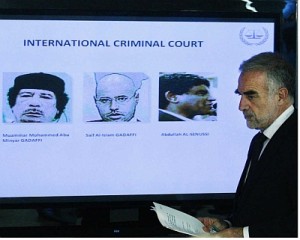
It is amazing to think that it has been almost exactly a year since Libyan leader Muammar Gaddafi (Qaddafi) was killed by National Transitional Council forces in Sirte, Libya. While the news cycle has moved on to other problems, notably Syria, there are still lingering questions regarding the Libyan conflict. Most recently is the question of the prosecution of Col. Qaddafi’s confidents, son Seif al-Islam el-Qaddafi and brother-in-law Abdullah Senussi.
Seif was captured by NTC forces in November 2011 as he was trying to flee Libya. Since then, the International Criminal Court has tried to gather information on the detainees. The ICC has accused the men of crimes against humanity and wishes to try them at the Hague. However, the ICC can only try suspected criminals from nations who are unable or unwilling to carry out their own trials.
Last week, the ICC held a public hearing on exactly that issue. Libya has asked the ICC to abandon claims against the men and allow them to try them in the country. They also state they are conducting their own investigations and are “committed to holding fair trials”, although they have already been pushed back to February 2013. Defense lawyers claim that Libya’s assertions are empty claims and accuse Libya of denying the men access to lawyers and holding them in deplorable and isolated conditions.
After the death of Col. Qaddafi, many nations expressed outrage because he was killed instead of being tried for his own crimes against humanity. I believe the ICC’s push comes as a result of them trying to avoid the murder/assassinations of Seif and Abdullah and be able to use the judicial process to punish them.
I personally believe that sovereign nations should punish their criminals by a process involving their own citizens. However, I understand the concern of the ICC as well. If murder or life imprisonment without a trial replaces justice, where does that leave the world? Libya should not be allowed to imprison the men indefinitely but I am not sure the ICC trying the men would be an appropriate response to this situation. Libya might need some more time, since there was a civil war that tore the nation apart, to build an infrastructure to try criminals. It would help Libya’s healing and perhaps allow them to move on from the Qaddafi era.
Some questions to consider:
Should Libya be allowed to try Seif al-Islam el-Qaddafi and Abdullah Senussi? What happens if they keep postponing?
If a country does not have a functioning court system, should an international body take over?
Article Source: CNN
Photo Source: LSE
ICC Brief: ICC